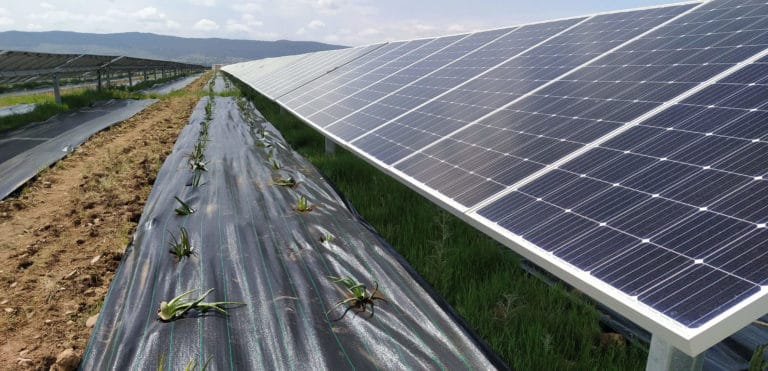Enel Green Power Australia, a subsidiary of Italian energy giant Enel, will explore how to combine solar PV generation and agricultural production in a new research program to be undertaken at its Cohuna Solar Farm in northern Victoria.
The research project, which will assess the benefits of agrivoltaics in terms of operational efficiency and maintenance, will also look to increase the sustainability of utility-scale solar PV facilities. It is being rolled out at the 34 MW Cohuna Solar Farm in northern Victoria. The 82-hectare solar farm is still in the construction phase. Once complete, it will feature about 87,000 bifacial modules mounted on single-axis trackers.
Enel, in partnership with Agriculture Victoria, has already launched an agrivoltaics project at the site. It plans to identify the best pastoral farming plants that can coexist with solar panels and explore how the spaces between the arrays can potentially be utilized for agricultural production.
Miriam Di Blasi, Enel’s head of environment and impacts mitigation, said she is confident the design of the Cohuna Solar Farm will provide “best practices” for large-scale solar PV facilities throughout the world.
“These experiments will produce a huge amount of data that will be compiled in an atlas to support future decisions, enabling new plants to select the best farming solutions and related business models based on the solar technology, the local climate and the analyses of the social, economic and environmental context,” she said.
Much of the land near the Cohuna Solar Farm is home to sheep grazing operations. While ‘solar grazing’ is proving to be a popular form of land co-use for large-scale solar, other forms of agrivoltaics are emerging that support horticulture, viticulture, aquaculture and even cropping activities.
Di Blasi said the Cohuna agrivoltaics project will seek to identify what low-lying pastures and crops can be grown beneath the modules. Wheat, barley and canola are among the crops that are already being grown in the region. Members of the Agriculture Victoria team visited the Cohuna site in April, marking the beginning of the first phase in the research project, which Di Blasi said would be a 12-month “massive monitoring and data-gathering” process.
Di Blasi said the data will be used to identify the best plants for the conditions and sustainable agriculture production. This phase is due to be completed in May 2022, with the data to inform phase two of the project.
The Cohuna plant is the latest site to be added to the research project with Enel, which manages 49 GW at 1,200 sites in 32 countries. It is already exploring agrivoltaic opportunities at nine of its solar farms in Spain, Italy and Greece. Testing at the European sites began in January with the planting a number of vegetables, herbs and legumes.
Werther Esposito, country manager for Enel Australia, said the Cohuna project aligns with company’s focus of creating shared opportunities, and combining energy efficiency and the sustainable use of land.
“We’re proactively working with our local stakeholders to explore how we can contribute to building adaptive and resilient agricultural systems through diversified and sustainable use of land at our project sites,” he said.
The Cohuna Solar Farm is Enel’s second solar PV facility in Australia. Enel, in a joint venture with Dutch Infrastructure Fund, also owns the 275 MW Bungala Solar Farm, near Port Augusta, South Australia.
This content is protected by copyright and may not be reused. If you want to cooperate with us and would like to reuse some of our content, please contact: editors@pv-magazine.com.




By submitting this form you agree to pv magazine using your data for the purposes of publishing your comment.
Your personal data will only be disclosed or otherwise transmitted to third parties for the purposes of spam filtering or if this is necessary for technical maintenance of the website. Any other transfer to third parties will not take place unless this is justified on the basis of applicable data protection regulations or if pv magazine is legally obliged to do so.
You may revoke this consent at any time with effect for the future, in which case your personal data will be deleted immediately. Otherwise, your data will be deleted if pv magazine has processed your request or the purpose of data storage is fulfilled.
Further information on data privacy can be found in our Data Protection Policy.